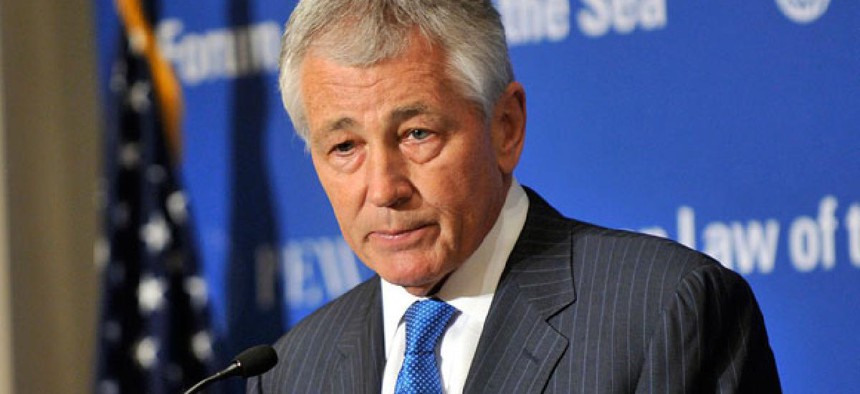
Defense Department
Analysis: Chuck Hagel, Strategic Thinker
Why aren’t more pundits defending the Defense nominee for foreseeing today’s budget problems? Probably because they were wrong themselves.
It looks awfully likely that Chuck Hagel will squeak through confirmation as President Obama's Defense secretary. But it is also likely that he'll enter the Pentagon a damaged figure, a nominee tainted by the lingering impression that he is not ready to handle the vast complexities of a defense budget slated for slashing. Sen. Lindsey Graham, R-S.C., in telling Fox News Sunday that he would no longer block a Hagel vote, still indicated he was shifting his position reluctantly. He called Hagel "one of the most unqualified, radical choices for secretary of Defense in a long time."
Unqualified? Radical? Hagel did himself no favors, of course, with his unsteady performance at his confirmation hearing two and a half weeks ago. But what has gone largely unnoted by the punditocracy is that, over the past decade or so, the former Republican senator from Nebraska has distinguished himself with subtle, well-thought-out, and accurate analyses of some of America's greatest strategic challenges of the 21st century--especially the response to 9/11--while many of his harshest critics got these issues quite wrong.
Even Hagel's defenders, scarce though they still seem today, have not addressed this question well. Consider Thomas Friedman, perhaps the most widely read foreign-affairs columnist of our time. In a column in The New York Times on Dec. 25, Friedman supported the Hagel nomination even though he said Hagel's views on Israel and Iran were "out of the mainstream."
"The legitimate philosophical criticism of Hagel concerns his stated preferences for finding a negotiated solution to Iran's nuclear program, his willingness to engage Hamas to see if it can be moved from its extremism, his belief that the Pentagon budget must be cut, and his aversion to going to war again in places like Iraq and Afghanistan, because he has been to war and knows how much can go wrong," Friedman wrote. "Whether you agree with these views or not, it would be nothing but healthy to have them included in the president's national security debates."
This was faint praise indeed. Perhaps it might even be more "healthy" to have a Pentagon chief whose views on these issues have so often proved right in contrast to so many others, including Friedman himself. Much has been made of Hagel's opposition to the Bush administration's turn toward Iraq a decade ago, but what is more important are the reasons Hagel gave at the time for this lonely stand. In an interview he did with me in the summer of 2002, Hagel laid out a sophisticated vision of a foreign policy that needed to balance "realism and idealism," one that was governed, above all, by a careful assessment of what it might mean to divert precious resources--both human and monetary--to Iraq when Afghanistan was still so unfinished.
"We are involved in something here we've never had to face before," Hagel said as the Bush administration turned its war machine toward Iraq, expressing concern to me that the minuscule security forces left behind in Afghanistan would not be enough. "The coalition forces run the risk of having not an adequate force on the ground to be able to give the Afghans under the [Hamid] Karzai government a reasonable chance to succeed with the monumental task that government has," he said. "I have always believed that once we engaged in Afghanistan the way we did, we had to see it through not just for Afghanistan but also because our prestige was on the line. The greatest risk is allowing that to unwind and go backward."
As we now know, Afghanistan did unwind and go backward, thanks in large part to U.S. inattention. In the first years after the fall of the Taliban, aid amounted to just $67 a year per Afghan, a meager figure compared to nation-building exercises such as Bosnia ($249) and East Timor ($256), according to Beth DeGrasse of the U.S. Institute of Peace. Jim Dobbins, Bush's former special envoy to Kabul, told me in an interview in 2006 that Afghanistan was the "most under-resourced nation-building effort in history." Another senior Bush administration official, former reconstruction coordinator Carlos Pascual, also said at the time that the State Department had "maybe 20 to 30 percent" of the people it needed in Afghanistan.
Yet as much as Hagel raised concerns about backsliding in the actual theater of the war against al-Qaida, he also worried presciently about U.S. overreach, as well as alienating allies around the world that were critical to fighting a global struggle against transnational terrorists. Hagel foresaw that unless Washington was more careful about the exercise of hard power, we would find ourselves in the very crisis we are in today, with a $600 billion-plus defense budget that the president and Congress have now mandated be cut by $500 billion over the next decade. Hagel saw that, in Iraq, America was taking on an already weakened leader who the senator said probably didn't have weapons of mass destruction, and at the same time empowering another regime (Iran) that badly wanted WMDs--a dire development further documented on Monday by The Washington Post, which reported that the Iranian-backed Shiite group Asaib Ahl al-Haq, the "League of the Righteous," is exerting new political power in Iraq.
Hagel also delivered some of the earliest warnings about the potentially disastrous effects of George W. Bush's ill-grounded "Axis of Evil" speech, in which the president needlessly alienated Tehran only days after the Iranians had actually delivered up aid and support to stabilize post-Taliban Afghanistan. Ironically, Bush's own officials on the ground in Afghanistan, such as Dobbins, had testified to Iran's measured policies at the time. They noted that at a 2002 donor's conference in Tokyo that occurred only a week before the Axis of Evil speech, Iran pledged $500 million--at the time, more than double the Americans' contribution-- to help rebuild Afghanistan. "Iran actually has been quite helpful in Afghanistan," Hagel, then a member of the Senate Foreign Relations Committee, told Congressional Quarterly on Feb. 1, 2002. "And we're giving them the back of our hand." Hagel added: "We're not isolating [the Iranians]. We're isolating ourselves.... We ought to be a little more thoughtful. That [axis] comment only helps the mullahs."
Hagel was, in other words, displaying a deeply knowledgeable, well-grounded sense of the actual (monetary) and strategic costs of war, a critical faculty that will be badly needed in the months ahead as he grapples with the possibility of sequestration and budget cuts. His skepticism has since been vindicated by a large number of studies of the titanic costs of launching wars in both Iraq and Afghanistan, amounting to multiple trillions of dollars. A Rand Corp. study in 2010 even concluded that the chaos in Iraq following the U.S. invasion "stalled or reversed the momentum of Arab political reform; local regimes perceive that U.S. distraction in Iraq and the subsequent focus on Iran have given them a reprieve on domestic liberalization."
What were Hagel's critics of today, and even some of his lukewarm defenders, saying at the same time? On March 13, 2003, seven days before the Iraq invasion, the Times' Friedman wrote: "This war is so unprecedented that it has always been a gut call-and my gut has told me four things. First, this is a war of choice. Saddam Hussein poses no direct threat to us today. But confronting him is a legitimate choice-much more legitimate than knee-jerk liberals and pacifists think. Removing Mr. Hussein-with his obsession to obtain weapons of mass destruction-ending his tyranny and helping to nurture a more progressive Iraq that could spur reform across the Arab-Muslim world are the best long-term responses to bin Ladenism."
Chuck Hagel, of course, was no knee-jerk liberal. He was, demonstrably, smart and strategic about the risks of a terrible expense in blood and treasure that lay ahead-- far more than many others. And he deserves more credit for that than he is getting. Perhaps Hagel is, after all, just the man to tackle the Defense Department budget.
NEXT STORY: Reid: Hagel Vote to Be Held Friday







